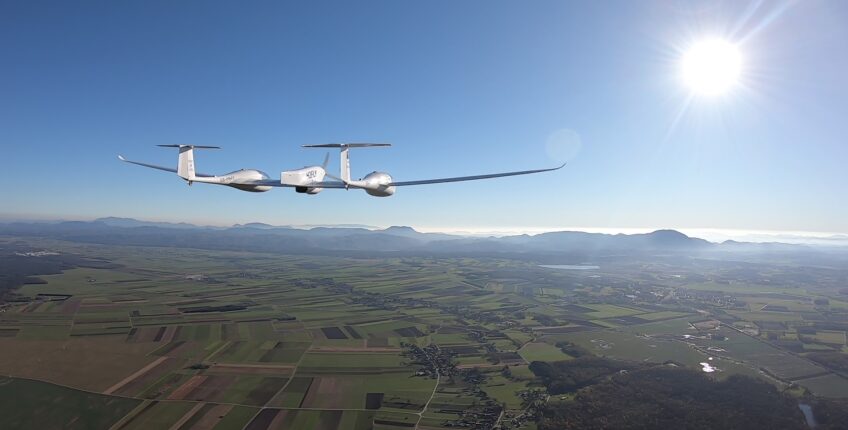Having successfully completed test flights, the first four-seater passenger aircraft powered solely by a hydrogen fuel cell battery system was unveiled at its home airport of Stuttgart on 11 December 2020. It incorporates the latest generation of zero-emission propulsion technology.
“Only through the cooperation of a team of specialists is a project like HY4 feasible,” declared Prof. Josef Kallo, Head of Component Development in the HY4 project at the DLR Institute of Technical Thermodynamics (DLR-TT), Professor at the University of Ulm and Scientific Advisor to H2FLY. His team devoted four years to developing a new propulsion system. “Now we can think in terms of larger systems: air taxis for four passengers, small aircraft for up to 19 passengers and regional transport with propulsion systems for up to 40 passengers and a range of 2000 km will be feasible within the next decade. This project was only possible because the preceding projects received a total of 17.3 million euros in funding support from the Federal Ministry of Transport and Digital Infrastructure (BMVI) within the framework of the National Innovation Programme Hydrogen and Fuel Cell Technology (NIP).”
The HY4 is operated by H2FLY, a start-up of the German Aerospace Center (DLR – Deutsches Zentrum für Luft- und Raumfahrt). The new powertrain was developed jointly together with the University of Ulm, DLR-TT, Diehl Aerospace, Pipistrel (Slovenia) and the Politecnica di Milano, TU Delft and the University of Maribor. H2FLY GmbH is responsible for the overall system architecture consisting of the hydrogen tanks, fuel cell, battery, power distribution and electric motor. Over the next six months, the HY4 will be further tested at its home airport in Stuttgart.
Zero-emission flying thanks to hydrogen fuel cell propulsion
The HY4’s powertrain consists of a hydrogen storage tank, a low-temperature hydrogen fuel cell and a high-performance battery. The fuel cell converts the energy of the on-board hydrogen fuel into electrical energy. The only waste product is water. With the power generated in this manner, the electric motor drives the aircraft’s propeller. The on-board lithium-ion battery supplies additional power during the take-off phase and during climbs. Provided that the hydrogen needed for the fuel cell is produced by electrolysis, which uses electricity from renewable sources, the HY4 flies completely emission-free.
With an output of 120 kilowatts, the HY4’s electric motor enables a top speed of around 200 and a cruising speed of 165 kilometres per hour. Depending on speed, altitude and payload, a range of between 750 and 1,500 kilometres is possible. The HY4 is characterised by its twin fuselages, which are connected to each other via the wing. Each of the two fuselages has room for two passengers. The maximum weight of the HY4 is 1,500 kilograms.
Funding support from the BMVI within the framework of the NIP, coordinated by NOW GmbH
As part of the National Innovation Programme Hydrogen and Fuel Cell Technology (NIP), the technical foundations of the aircraft were funded with more than 17 million euros of financial support from the Federal Ministry of Transport and Digital Infrastructure. Several projects were assisted in this context by the National Organisation Hydrogen and Fuel Energy (NOW) and by the project management organisation Projektträger Jülich (PtJ).
Further funds were provided by the LUFO Luftfahrtforschungsprogramm (aeronautics research programme) and the EU project MAHEPA (Horizon 2020). Other supporters include the University of Ulm, the DLR and Stuttgart Airport.
Quotes:
Andreas Scheuer, Federal Minister of Transport and Digital Infrastructure: “The HY4 hydrogen aircraft is innovative, quiet and climate-friendly. It shows that CO2-free aviation is both possible and feasible already today. This new way of flying has what it takes to change mobility in the long term. Germany is a pioneer in this high-tech field: HY4 is the world’s first four-seater passenger aircraft that flies purely electrically using fuel cells. This is a prime example of innovation Made in Germany, ensuring jobs and value creation in our country.”
Kurt-Christoph von Knobelsdorff, Managing Director (Chair) of NOW GmbH: “With the HY4 hydrogen aircraft and its future development stages, a starting signal is being sounded for zero-emission air transport with hydrogen – which represents a major achievement! It demonstrates how important public funding such as our National Innovation Programme Hydrogen and Fuel Cell Technology can be for the development of ground-breaking technologies.”
For more information and the latest images and video footage, please visit: www.h2fly.de.


